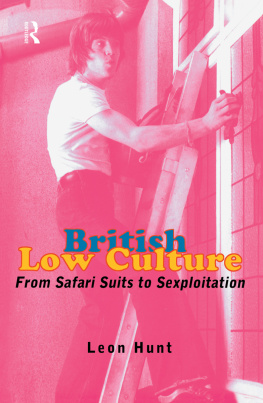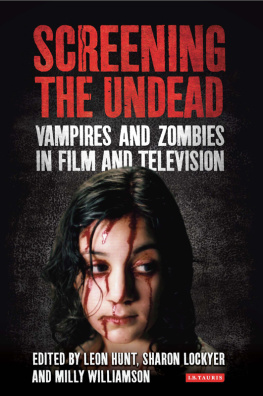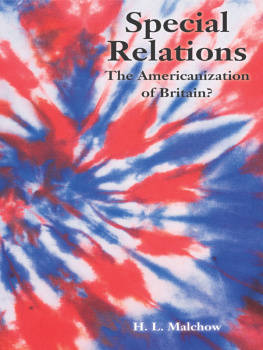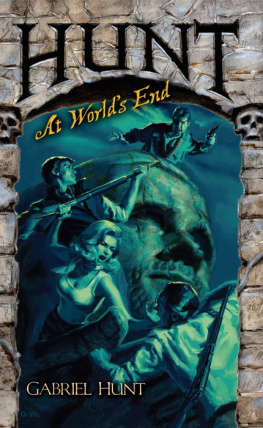
BRITISH LOW CULTURE
Hunts analysis of the soft-core porn and horror film genres of the 1970s, of mass market literature exploiting emergent youth subcultures, and of television shows such as The Persuaders!, offers up the sort of meticulous archaeology which cultural studies needs at the present time.
Will Straw, McGill University, Montreal
To read Leon Hunts book is to visit a half-forgotten world of glam rock, sitcoms, pulp fiction and soft porn. The reader is both captivated and appalled by Hunts clear-eyed portrait of a past cultural era that still echoes in the present.
John Street, University of East Anglia
Flares, lava lamps and safari suits and a national cinema dominated by smutty comedy and cheap softcore have all made 1970s popular culture appear too gruesome to recycle as nostalgia and too offensive for academic study. But the generic artefacts of the 1970s, such as sexploitation films, skinhead novels, glam rock and the mythology of wife-swapping suburbia have become important reference points and are now embraced by contemporary popular culture.
British Low Culture revisits the 1970s through some of its least respectable texts: television programmes such as Jason King, The Persuaders! and On the Buses; films such as Surburban Wives, House of Whipcord and Confessions of a Window Cleaner, and the prime-time titillation and smut of comedians such as Benny Hill. Identifying permissive populism, the trickle down of permissiveness into mass consumption, as a key feature of the 1970s, Leon Hunt considers the values of an ostensibly bad decade and analyses the implications of the 1970s for issues of taste and cultural capital. Hunt explores how the British cultural landscape of the 1970s coincided with moral panics, the troubled Heath government, the three-day week and the fragmentation of British society by nationalism, class conflict, race, gender and sexuality.
Leon Hunt is a lecturer in film and television studies at Brunel University. He has contributed to Velvet Light Trap, Necronomicon and You Tarzan: Masculinity, Movies and Men.
BRITISH LOW CULTURE
From safari suits to sexploitation
Leon Hunt

First published 1998
by Routledge
2 Park Square, Milton Park, Abingdon, Oxon, OX14 4RN
Transferred to Digital Printing 2004
Simultaneously published in the USA and Canada
by Routledge
29 West 35th Street, New York, NY 10001
1998 Leon Hunt
Typeset in Joanna and Bembo by
Ponting-Green Publishing Services
Chesham, Buckinghamshire
All rights reserved. No part of this book may be reprinted or reproduced or utilized in any form or by any electronic, mechanical. or other means, now known or hereafter invented, including photocopying and recording, or in any information storage or retrieval system, without permission in writing from the publishers.
British Library Cataloguing in Publication Data
A catalogue record for this book is available from the British Library
Library of Congress Cataloguing in Publication Data
Hunt, Leon
British Low Culture : from safari suits to sexploitation / Leon Hunt.
p. cm.
Includes bibliographical references and index.
1. Great BritainSocial life and customs20th century.
2. Popular cultureGreat BritainHistory20th century.
I. Title.
DA589.4.H86 1998
306.094109045dc21 9737619
ISBN 0415151821 (hbk)
ISBN 041515183X (pbk)
CONTENTS
Raucous pleasures: On the Buses
Bus Drivers Stomach and Ear oles: On the Buses
Prime-time permissiveness: Man About the House
Safari Suit Man (1): The Persuaders!
Safari Suit Man (2): Jason King
Suburban sexuality awakes: Suburban Wives
Nose pressed against the window of permissiveness: Confessions of a Window Cleaner
Rolling Stone or lecherous goldfish: Confessions of a Pop Performer
From music hall to pornocracy: Come Play With Me
Selsdon Man(iac) takes centre stage: House of Whipcord
The author and publisher would like to thank the following for permission to use stills: The Kobal Collection for Confessions of a Window Cleaner and Confessions of a Pop Performer, Polygram/Pictorial Press for Jason King and The Persuaders!, Thames Television for Man About the House and London Weekend Television for On the Buses; stills from On the Buses reproduced by BFI Stills, Posters and Designs. Every effort has been made to obtain permission to reproduce the photographs and posters. If any proper acknowledgement has not been made, we invite copyright holders to inform us of the oversight.
Several people read draft chapters from this book and I would like to thank Carol Jenks, Tanya Krzywinska, Andy Medhurst and Mike Wayne for their comments and suggestions. They may not agree with everything in the book (translation: dont blame them), but their input was invaluable. Ian Abraham, Steve Chibnall, Ian Conrich and Ian Hunter helped locate or provided important primary materials. Thanks also to Richard Tomes for his Writers Block cartoon yes, I did Get Well Soon. Finally, I am grateful to Rebecca Barden for supporting and encouraging what must have sounded like a pretty wayward book.
This book is dedicated with love to Margaret and Beth Hunt, my mother and my sister.
THE DECADE THAT TASTE FORGOT?
Revisiting the 1970s
There is a kind of self-hatred in the eager embrace of mediocrity which characterises so much contemporary nostalgia. The spiritual impoverishment on show in Are You Being Served? makes you worry for a decade that could have found pleasure in it, but even more for one that would want to watch it again.
Ben Thompson (1993: 59)
Like a return of the repressed, the 1970s have in recent years come to exert a grip on the popular imagination. The signs of it have been everywhere; nostalgic archival television such as Sounds of the 70s (BBC 1993), Channel 4s Glamrock Weekend (1995) and Match of the Seventies (BBC 1995), a series of football snapshots where sideburns shared equal billing with golden goals; the glorification of period muzak in the so-called easy listening scene; reprints of youthsploitation fiction published by New English Library; the recirculation of 1970s television on video and cable, with sitcoms and safari-suit crime-busting (Jason King, The Persuaders!) particular favourites; the annual spectacle of Gary Glitter prising himself back into his silver suit for his Christmas Gang Show; the rediscovery of British cinemas last popular cycle, the sexploitation film; the rehabilitation of lava lamps and flares.
In popular accounts of the period, its the decade that style/taste forgot, an object of pleasurable, kitsch embarrassment. Inserious cultural histories, the two most frequently used words are crisis political/cultural crisis, Policing the Crisis and closure. The latter is embedded, albeit quizzically, in the title of Bart Moore-Gilberts anthology The Arts in the 1970s: Cultural Closure? which considers the 1970s as a crisis in the grand narrative of progressive, politically and aesthetically enlightened culture. In his introduction, Moore-Gilbert offers the concept of post-avantgardism as a negotiation of this closure, a more fragmented cultural production associated both with the impact of black, feminist, gay and lesbian politics and with new outlets and material bases for such work (workshops and specialist bookshops, for example) the context of reception and modes of address offered by a given work of art thus becomes at least as important as subversion of stylistic norms in determining political effectivity (Moore-Gilbert 1994: 21). Inherent in this progressive narrative is the legacy of the 1960s, characterised by an earlier volume (again with a qualifying question mark) as a cultural revolution (Moore-Gilbert and Seed 1992). This is an important narrative, but not the one with which the present book is directly concerned.
Next page








